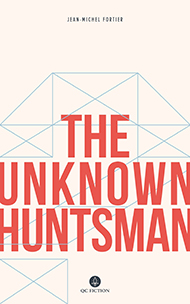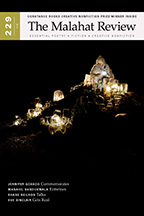Reviews
Fiction Review by Rhonda Mullins
Jean-Michel Fortier, translated by Katherine Hastings, The Unknown Huntsman (Montreal: QC Fiction, 2016). Paperbound, 192 pp., $19.95.
 Inhabiting an uncertain space between knowing and not knowing, readers could almost join the characters in Jean-Michel Fortier’s novel The Unknown Huntsman (Katherine Hastings, translator). Fortier’s debut novel serves up a strange and colourful cast of characters who are in a nearly constant state of confusion. Set in an unnamed village in the middle of nowhere at the end of the road, a village with only a handful of inhabitants, The Unknown Huntsman draws readers into a world of intrigue and gossip, populated by busybodies and control freaks. It is a world where the apothecary announces to the entire village what he prescribes for whom, and where the villagers are stunned by the simplest of things. This is also a village where residents mount petitions to reveal what is written on scraps of paper found while nosily rifling through another person’s drawers.
Inhabiting an uncertain space between knowing and not knowing, readers could almost join the characters in Jean-Michel Fortier’s novel The Unknown Huntsman (Katherine Hastings, translator). Fortier’s debut novel serves up a strange and colourful cast of characters who are in a nearly constant state of confusion. Set in an unnamed village in the middle of nowhere at the end of the road, a village with only a handful of inhabitants, The Unknown Huntsman draws readers into a world of intrigue and gossip, populated by busybodies and control freaks. It is a world where the apothecary announces to the entire village what he prescribes for whom, and where the villagers are stunned by the simplest of things. This is also a village where residents mount petitions to reveal what is written on scraps of paper found while nosily rifling through another person’s drawers.
The characters include Leaven the Baker, the mayor’s wife, Morosity Gross, fast friends Albania and Mrs. Latvia, and the incompetent Dr. Harmer, who is well past his prime and lives up to his name. Then there is the nameless narrator, who marvels at the slightest development and is the novel’s creepy voice, referring to himself or herself as “we.” “Our voice quivers slightly,” he or she says, when asking a question of his or her betters.
The residents of the village meet twice a week: the Monday meeting is used to air dirty laundry and petty grievances against fellow citizens. Accusations of bread thieving and pen poaching fly, leaving the villagers breathless with the intrigue and astonishing turns of events. There is a great deal of collective gasping. Matters are settled by a show of hands and sealed with a collective e basta, an indulgence offered to the village’s Italian resident, Giorgio Cantarini, whose wife boiled to death in a laundry incident.
The Friday meetings, which only a subset of the villagers attend, are secret, and presided over by a gun-toting professor, who belittles and berates them, and to whom the narrator refers as their master. They are desperate to please him, eager for the paltry honours he bestows upon them, such as the time he let them hold his coat. He wields his gun like a gavel, shooting out windows over false accusations and pointing it at anyone who speaks out of turn. The purpose of the Friday meetings is unclear, with the only allusion to its function ending with an ellipsis.
The intrigue builds around the deaths of two villagers, both deemed accidental by the village powers that be, but that are still shrouded in mystery. Some of the villagers grow suspicious and try to follow the chain of clues, which includes licorice wrappers, overheard phone calls, a young girl’s diary, and bits of paper. It seems there’s trouble in Tulipland, as Mrs. Latvia is fond of saying.
While some villagers are trying to solve the mysteries, others endeavour to cover them up, particularly once a stranger shows up in the village. He is their first visitor in ten years, a self-proclaimed census-taker who is asking awkward questions, such as people’s names, ages, and occupations. The professor does his best to run him off, making it known that “Nobody here needs to be sensed.”
The tone Fortier creates can be cheerful and chatty, but there is something sinister about this close-knit, closed-minded community. A cloud of indoctrination hangs over the place, and the sense of awe, represented by emphatic proper nouns—the Stranger, the Petition, the Census-taker—makes for an unsettling atmosphere.
As the intrigue unfolds, more questions are raised than answered, as Fortier breaks with the convention of neatly tying off his story lines. The mayor and the professor call for the novel to end before all can be revealed. “There is one step left, one last step, to ensure we all enjoy eternal peace. To end, once and for all, this damned season, this damned novel.”
The absurdity, irony, and dark humour make this an exuberant novel and a compelling read. The Unknown Huntsman is all about voice, which translator Katherine Hastings captures flawlessly. She deftly handles the wordplay, the humour, even the malapropisms. It is pitch perfect, not a word out of place—an accomplishment for this first-time literary translator.
For the original French version, Le chasseur inconnu (Éditions La Mèche), the Montreal-based Fortier was nominated for the 2015 Grand Prix littéraire Archambault, a Quebec literary award whose past laureates include Michel Tremblay and Kim Thúy. The honour is well-deserved, as this debut novel is highly original, shifting between levity and darkness with a masterful hand.
—Rhonda Mullins









